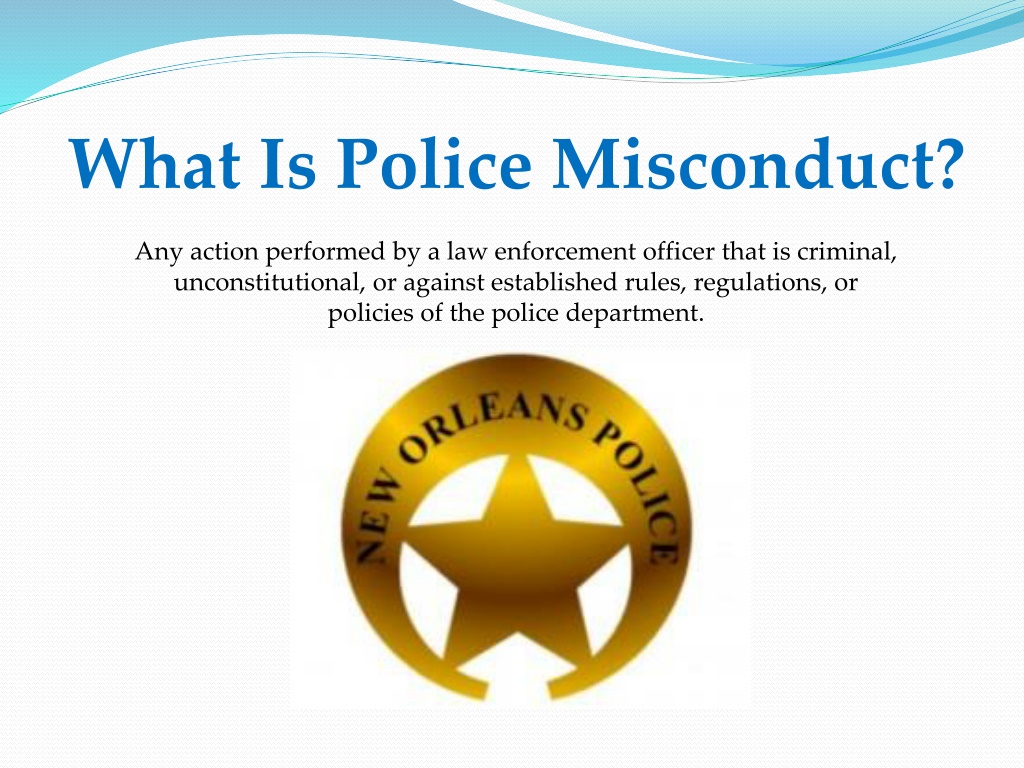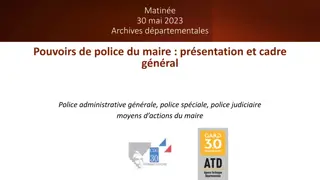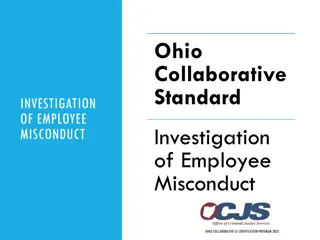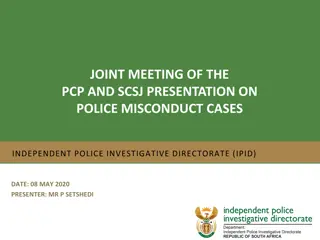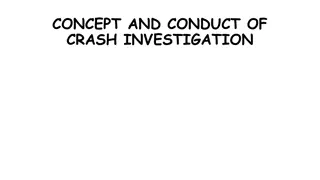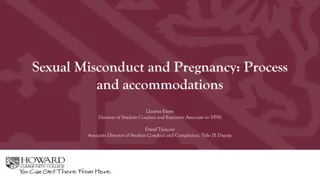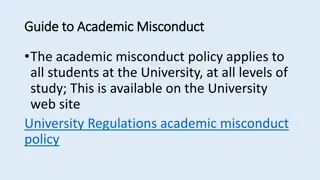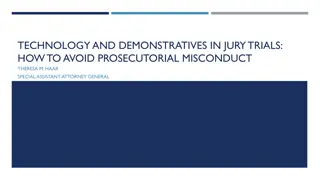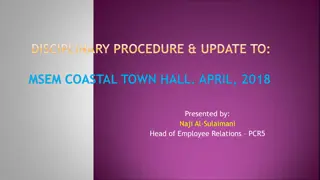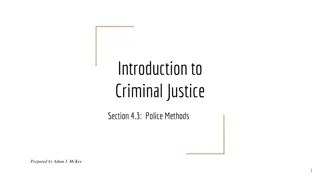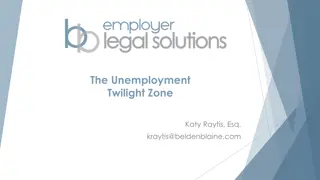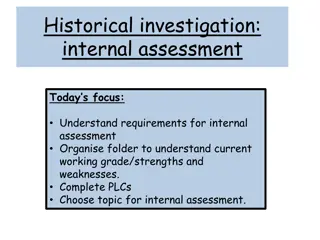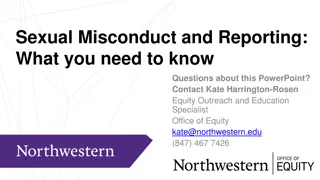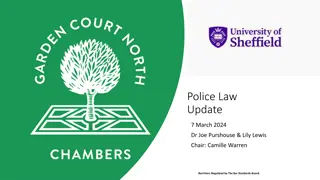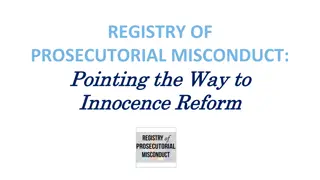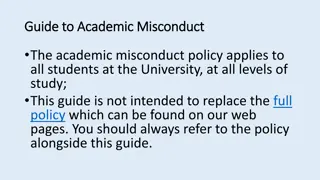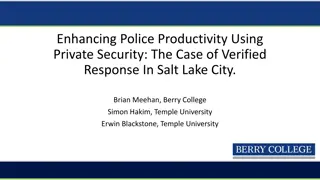Understanding Police Misconduct: Reporting and Investigation Process
Police misconduct refers to any unlawful or unethical actions by law enforcement officers. It can take various forms such as bias, excessive force, and criminal behavior. Filing a complaint is crucial to hold officers accountable, improve department standards, and strengthen community relations. Anyone can report misconduct, and important details like who, when, and where are needed for a thorough investigation. Acting promptly and providing all relevant information can help address misconduct effectively.
Download Presentation

Please find below an Image/Link to download the presentation.
The content on the website is provided AS IS for your information and personal use only. It may not be sold, licensed, or shared on other websites without obtaining consent from the author. Download presentation by click this link. If you encounter any issues during the download, it is possible that the publisher has removed the file from their server.
E N D
Presentation Transcript
What Is Police Misconduct? Any action performed by a law enforcement officer that is criminal, unconstitutional, or against established rules, regulations, or policies of the police department.
Misconduct can take many forms Administrative violation Bias, discrimination, harassment, or retaliation Unauthorized use of force Color of law (i.e., false arrest) Sexual misconduct Criminal activity
Why file a complaint? o Complaints provide the NOPD with important feedback about the conduct of its officers and how they interact with members of the public. The NOPD wants its officers to behave professionally and ethically. Filing a misconduct complaint may: o Help the accused officer improve his/her performance; o Inform the Police Department of potential training or policy deficiencies; o Prevent future instances of misconduct; o Improve community relations.
Who can file a complaint? Anyone who has knowledge of police misconduct can file a complaint. This includes persons who have experienced misconduct directly or persons who have witnessed it. A complainant can be a resident or non-resident. A complainant can be a citizen or non-citizen. A complainant can be anonymous. A complaint cannot be refused.
When should you file a complaint? You should file a complaint as soon as possible after you have experienced or witnessed misconduct. However, consider the following: Organize your thoughts. Who did what to whom? Document details (photographs, etc., if needed). Contact or check for witnesses. Make a timeline, i.e. the precise sequence of events. Taking these steps before filing a complaint will aid its investigation and may help you obtain a desired result. Evidence may be needed to prove misconduct, but filing a complaint sooner is better than filing later.
What information is necessary? A misconduct complaint can be filed with little information. An investigator will try to fill in the blanks. However, providing all the information you have will help to make the investigation thorough and complete. Key facts include: Who committed the misconduct (if you don t have a name, a description or other identifying info is helpful). Where and when the misconduct occurred. What happened (what did the officer say or do?).
How do you make a complaint? The Public Integrity Bureau accepts complaints by phone, fax, e-mail, mail, in person, and online: Visit 118 N. Rocheblave St., 8 a.m.-4 p.m. Fax (504) 658-6809 Call (504) 658-6800 E-mail NOPDPIB@nola.gov Visit www.nola.gov/nopd/citizen-services/complaints. You can also report a complaint to any officer. Request a form or give the complaint info verbally. Forms are available in district stations and other sites.
Where else can I file a complaint? The Independent Police Monitor accepts complaints at 525 St. Charles Avenue, NO LA 70130. Call (504) 681-3223 for an appointment. You can also contact the District Attorney s office, the Federal Bureau of Investigations, or Dept. of Justice: DA (504) 822-2414 FBI (504) 522-4671 DOJ (504) 680-3000
How does the process work? An intake specialist, or the person to whom you make a complaint, may ask you questions and help you fill out a complaint form. Once the complaint is received, PIB will review, classify, and process it. The complaint may be assigned to an investigator. Once the complaint is assigned, an investigator will contact you and other witnesses, conduct interviews, obtain all evidence and relevant information. An investigator will recommend a disposition.
What are the possible outcomes? A misconduct investigator can recommend one of four possible dispositions for each allegation: Sustained Means the alleged misconduct did occur. Not sustained Alleged misconduct couldn t be proven. Unfounded Alleged misconduct did not occur. Exonerated Alleged conduct occurred but did not violate the law, or NOPD rules, policies or procedures. The Superintendent of Police makes the ultimate decision for each case s disposition and discipline. Punishment can range from a letter of reprimand to dismissal.
Mediation may be an option. Certain complaints such as neglect of duty, discourtesy, and lack of professionalism may be eligible for confidential mediation. Mediation is offered by the Independent Police Monitor as an alternative to the investigation process. Mediation is intended to: Identify disputed issues; Facilitate communication; Improve community relations; and Reach a mutually acceptable resolution.
How do I find out what happened? The assigned investigator will contact you by letter once he or she has taken the case. He or she will inform you of the status of the investigation by letter. You may also call or e-mail the investigator. Each misconduct investigation takes time, depending on the complexity of the case. Interviewing witnesses and gathering evidence takes time. In general, misconduct investigations may take about two months to four months to complete.
Can I commend an officer? If you would like to commend an officer for his or her performance, you can communicate directly to that officer s supervisor verbally. You can also: Write a letter to the Superintendent of Police; Visit www. nola.gov/nopd/citizen-services and file a commendation online; or Fill out the commendation part of a universal complaint form.
